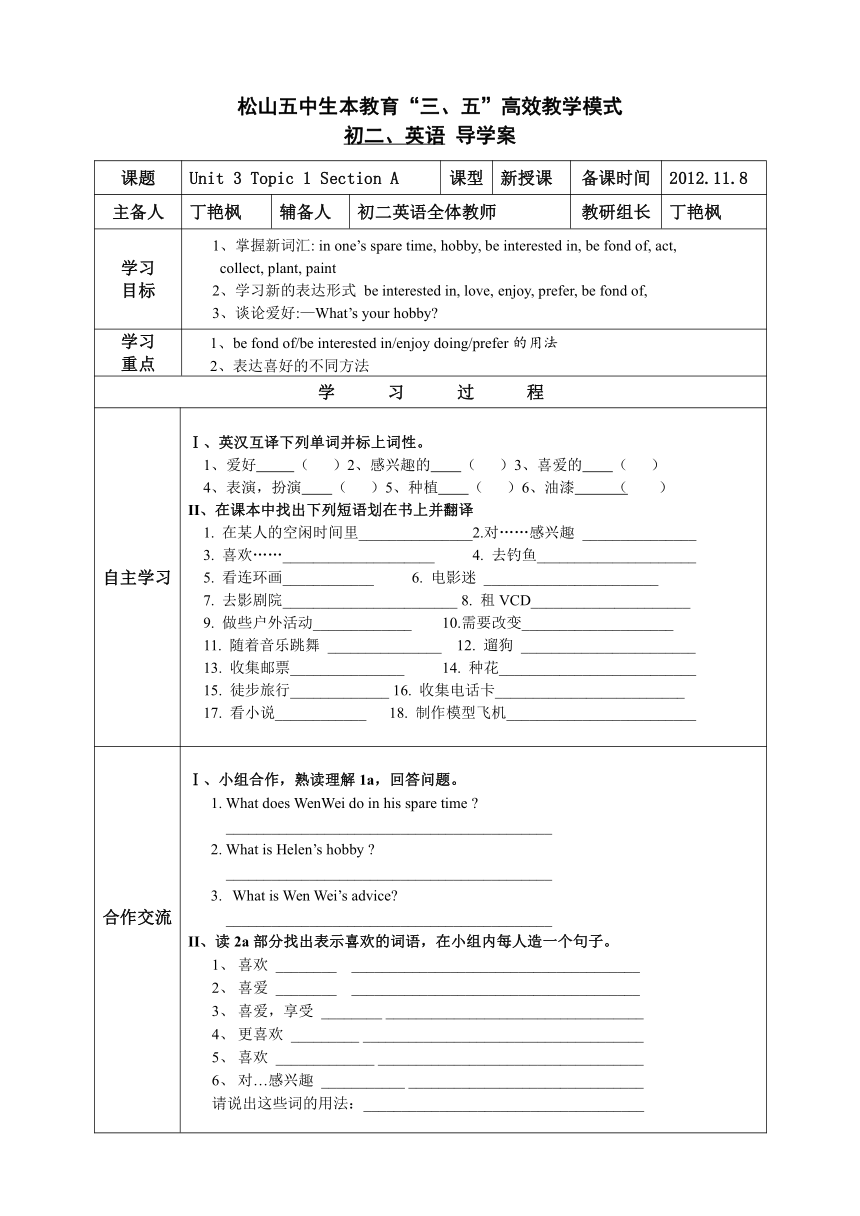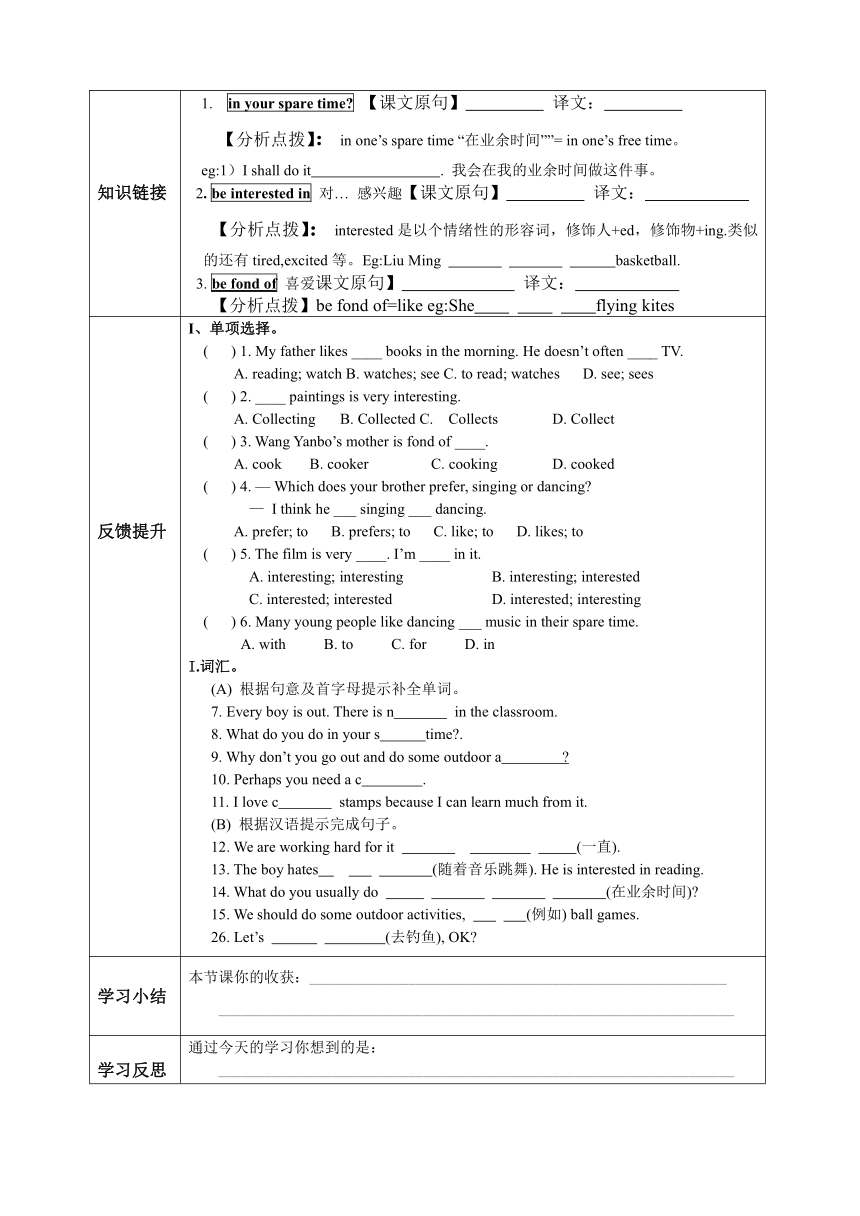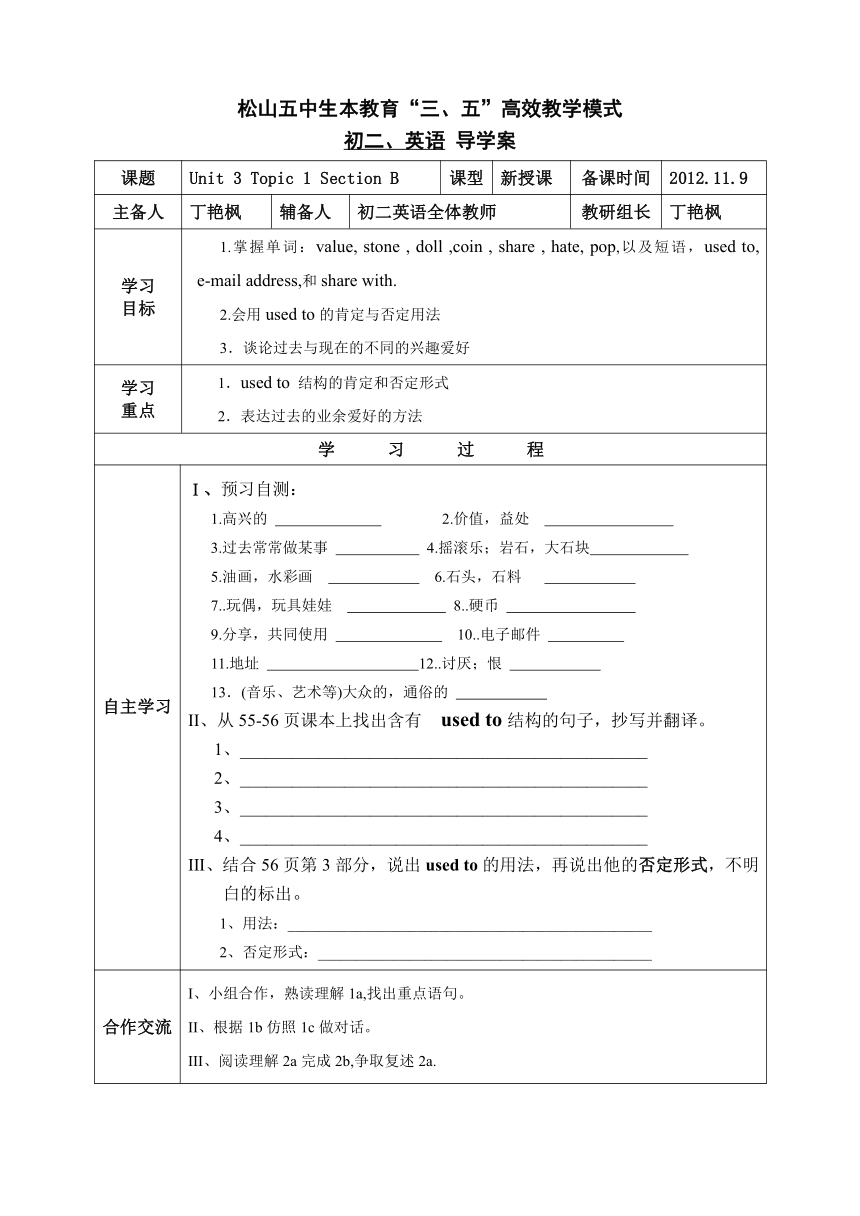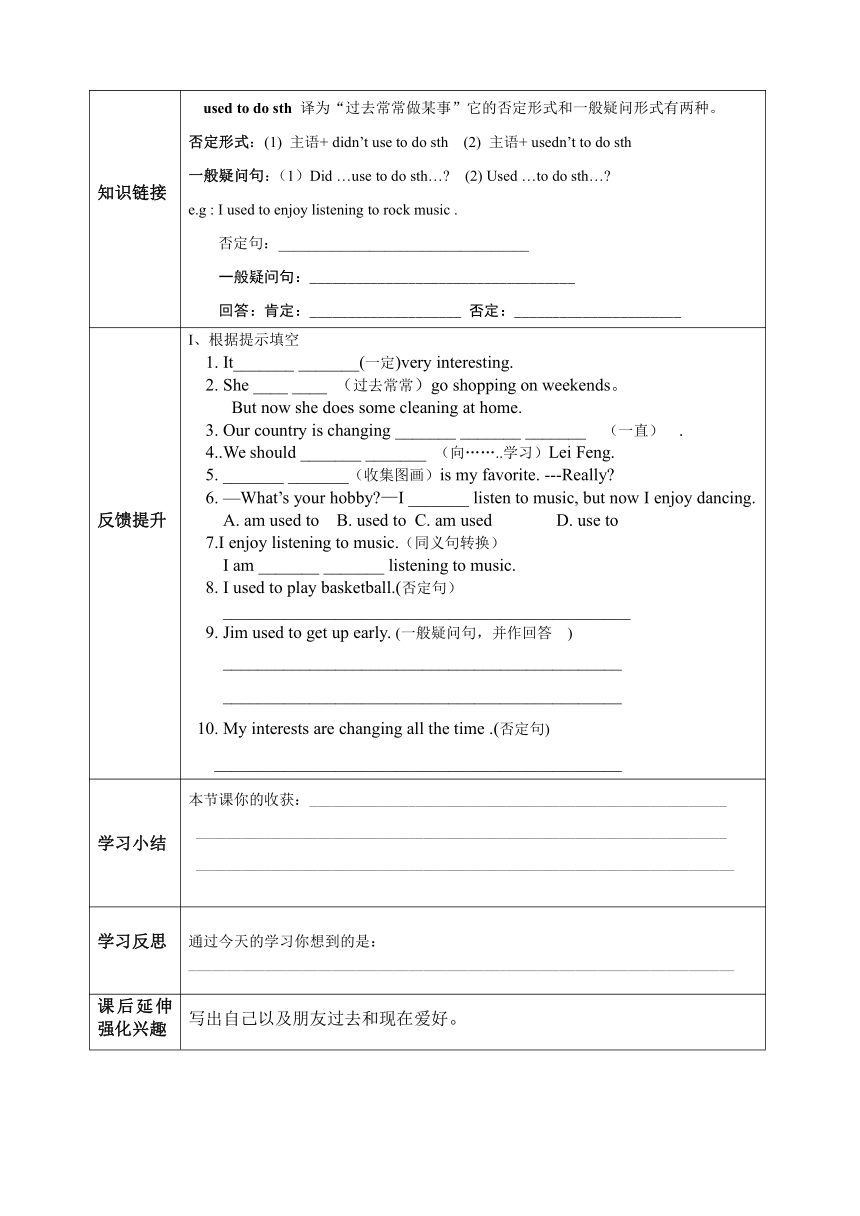Unit 3 Our Hobbies>Topic 1 What hobbies did you use to have?导学案
文档属性
| 名称 | Unit 3 Our Hobbies>Topic 1 What hobbies did you use to have?导学案 |  | |
| 格式 | zip | ||
| 文件大小 | 18.9KB | ||
| 资源类型 | 教案 | ||
| 版本资源 | 仁爱科普版 | ||
| 科目 | 英语 | ||
| 更新时间 | 2012-12-26 15:32:11 | ||
图片预览




文档简介
松山五中生本教育“三、五”高效教学模式
初二、英语 导学案
课题
Unit 3 Topic 1 Section A
课型
新授课
备课时间
2012.11.8
主备人
丁艳枫
辅备人
初二英语全体教师
教研组长
丁艳枫
学习
目标
1、掌握新词汇: in one’s spare time, hobby, be interested in, be fond of, act,
collect, plant, paint
2、学习新的表达形式 be interested in, love, enjoy, prefer, be fond of,
3、谈论爱好:—What’s your hobby?
学习
重点
1、be fond of/be interested in/enjoy doing/prefer的用法
2、表达喜好的不同方法
学 习 过 程
自主学习
Ⅰ、英汉互译下列单词并标上词性。
1、爱好 ( )2、感兴趣的 ( )3、喜爱的 ( )
4、表演,扮演 ( )5、种植 ( )6、油漆 ( )
II、在课本中找出下列短语划在书上并翻译
1. 在某人的空闲时间里_______________2.对……感兴趣 _______________
3. 喜欢……____________________ 4. 去钓鱼_____________________
5. 看连环画____________ 6. 电影迷 _______________________
7. 去影剧院_______________________ 8. 租VCD_____________________
9. 做些户外活动_____________ 10.需要改变____________________
11. 随着音乐跳舞 _______________ 12. 遛狗 _______________________
13. 收集邮票_______________ 14. 种花__________________________
15. 徒步旅行_____________ 16. 收集电话卡_________________________
17. 看小说____________ 18. 制作模型飞机_________________________
合作交流
Ⅰ、小组合作,熟读理解1a,回答问题。
1. What does WenWei do in his spare time ?
___________________________________________
2. What is Helen’s hobby ?
___________________________________________
3. What is Wen Wei’s advice?
___________________________________________
II、读2a部分找出表示喜欢的词语,在小组内每人造一个句子。
喜欢 ________ ______________________________________
喜爱 ________ ______________________________________
喜爱,享受 ________ __________________________________
更喜欢 _________ _____________________________________
喜欢 _____________ ___________________________________
对…感兴趣 ___________ _______________________________
请说出这些词的用法:_____________________________________
知识链接
in your spare time? 【课文原句】 译文:
【分析点拨】:in one’s spare time “在业余时间””= in one’s free time。
eg:1)I shall do it . 我会在我的业余时间做这件事。
2. be interested in 对… 感兴趣【课文原句】 译文:
【分析点拨】:interested是以个情绪性的形容词,修饰人+ed,修饰物+ing.类似的还有tired,excited等。Eg:Liu Ming basketball.
3. be fond of 喜爱课文原句】 译文:
【分析点拨】be fond of=like eg:She flying kites
反馈提升
I、单项选择。
( ) 1. My father likes ____ books in the morning. He doesn’t often ____ TV.
A. reading; watch B. watches; see C. to read; watches D. see; sees
( ) 2. ____ paintings is very interesting.
A. Collecting B. Collected C. Collects D. Collect
( ) 3. Wang Yanbo’s mother is fond of ____.
A. cook B. cooker C. cooking D. cooked
( ) 4. — Which does your brother prefer, singing or dancing?
— I think he ___ singing ___ dancing.
A. prefer; to B. prefers; to C. like; to D. likes; to
( ) 5. The film is very ____. I’m ____ in it.
A. interesting; interesting B. interesting; interested
C. interested; interested D. interested; interesting
( ) 6. Many young people like dancing ___ music in their spare time.
A. with B. to C. for D. in
I.词汇。
(A) 根据句意及首字母提示补全单词。
7. Every boy is out. There is n in the classroom.
8. What do you do in your s time?.
9. Why don’t you go out and do some outdoor a ?
10. Perhaps you need a c .
11. I love c stamps because I can learn much from it.
(B) 根据汉语提示完成句子。
12. We are working hard for it (一直).
13. The boy hates (随着音乐跳舞). He is interested in reading.
14. What do you usually do (在业余时间)?
15. We should do some outdoor activities, (例如) ball games.
26. Let’s (去钓鱼), OK?
学习小结
本节课你的收获:_______________________________________________________
____________________________________________________________________
学习反思
通过今天的学习你想到的是:
____________________________________________________________________
松山五中生本教育“三、五”高效教学模式
初二、英语 导学案
课题
Unit 3 Topic 1 Section B
课型
新授课
备课时间
2012.11.9
主备人
丁艳枫
辅备人
初二英语全体教师
教研组长
丁艳枫
学习
目标
1.掌握单词:value, stone , doll ,coin , share , hate, pop,以及短语,used to, e-mail address,和share with.
2.会用used to的肯定与否定用法
3.谈论过去与现在的不同的兴趣爱好
学习
重点
1.used to 结构的肯定和否定形式
2.表达过去的业余爱好的方法
学 习 过 程
自主学习
Ⅰ、预习自测:
1.高兴的 2.价值,益处
3.过去常常做某事 4.摇滚乐;岩石,大石块
5.油画,水彩画 6.石头,石料
7..玩偶,玩具娃娃 8..硬币
9.分享,共同使用 10..电子邮件
11.地址 12..讨厌;恨
13.(音乐、艺术等)大众的,通俗的
II、从55-56页课本上找出含有 used to结构的句子,抄写并翻译。
1、_______________________________________________
2、_______________________________________________
3、_______________________________________________
4、_______________________________________________
III、结合56页第3部分,说出used to的用法,再说出他的否定形式,不明白的标出。
1、用法:________________________________________________
2、否定形式:____________________________________________
合作交流
I、小组合作,熟读理解1a,找出重点语句。
II、根据1b仿照1c做对话。
III、阅读理解2a完成2b,争取复述2a.
知识链接
used to do sth 译为“过去常常做某事”它的否定形式和一般疑问形式有两种。
否定形式:(1) 主语+ didn’t use to do sth (2) 主语+ usedn’t to do sth
一般疑问句:(1)Did …use to do sth…? (2) Used …to do sth…?
e.g : I used to enjoy listening to rock music .
否定句:_________________________________
一般疑问句:___________________________________
回答:肯定:____________________ 否定:______________________
反馈提升
I、根据提示填空
1. It_______ _______(一定)very interesting.
2. She ____ ____ (过去常常)go shopping on weekends。
But now she does some cleaning at home.
3. Our country is changing _______ _______ _______?(一直)?.
4..We should _______ _______ (向……..学习)Lei Feng.
5. _______ _______(收集图画)is my favorite. ---Really?
6. —What’s your hobby?—I _______ listen to music, but now I enjoy dancing.
A. am used to B. used to C. am used D. use to
7.I enjoy listening to music.(同义句转换)
I am _______ _______ listening to music.
8. I used to play basketball.(否定句)
_______________________________________________
9. Jim used to get up early. (一般疑问句,并作回答 )
______________________________________________
______________________________________________
10. My interests are changing all the time .(否定句)
_______________________________________________
学习小结
本节课你的收获:_______________________________________________________
______________________________________________________________________
_______________________________________________________________________
学习反思
通过今天的学习你想到的是:
________________________________________________________________________
课后延伸强化兴趣
写出自己以及朋友过去和现在爱好。
松山五中生本教育“三、五”高效教学模式
初二、英语 导学案
课题
Unit 3 Topic 1 Section C
课型
新授课
备课时间
2012.11.10
主备人
丁艳枫
辅备人
初二英语全体教师
教研组长
丁艳枫
学习
目标
1.掌握单词pond ,vacation ,nobody, secret , friendship , knowledge, relaxing和短语daily work ,teach oneself。
2.学习used to 结构的疑问句形式
3.谈论兴趣爱好给人们带来的益处
学习
重点
1. used to 的疑问句形式
2.培养健康的业余.爱好的好处
学 习 过 程
自主学习
Ⅰ、英汉互译下列单词并标上词性。
1. pond ________ ( ) 2.vacation ________ ( )
3. nobody________ ( ) 4.secret________ ( )
5. friendship ________ ( ) 6.knowledge________ ( )
II、在课本中找出下列短语划在书上并翻译
1. 暑假 2..在池塘里
3.自学 4.它是一个秘密 _____
5.在房子前面 6..多么聪明
7.养宠物 8. 在网上聊天
9..带给人们快乐,友谊和知识
10..日常工作
III、自读1a,回答下面问题。
1.What did B use to do during the summer vacation?
_______________________________________________________
2.Where did B use to go swimming?
_________________________________________________________
IV、根据图片完成57页第2部分,把句子写在书上。
合作交流
Ⅰ、组内检查自主学习情况,互学互教,不明白的标出。
II、小组合作,熟读理解1a ,讨论上面的两个问题。
III、探讨used to 的疑问句形式,模仿1b做对话。
IV、核对57页第2部分。
V、阅读理解3a,找出重点语句。
知识链接
1. nobody 相当于 not anybody.译为“没有人,无人”
There is nobody in the room .= There ______ ______ in the room .
2. teach 的用法:(1)teach oneself 译为:_____________________
(2) teach sb sth 译为:_________________________
(3) teach sb to do sth 译为:_______________________
李老师教我们语文。Mr Li ______ _______ _______.
我们老师教我们做卡片 Our teacher _______ _______ ______ ______ _______ .
反馈提升
I、根据3a,完成短文填空,了解学生的掌握情况。
In their _____ time, people usually _____ pets, _____ on the Net, ______ stamps and so on.
Hobbies can bring people __________, ________ and _________. When people are tired, hobbies can help them _____. When people are ______ old, hobbies can _____ them ______. When people are sick, hobbies can help them get ____ soon.
II、句型转换
1. Li Lei used to go swimming in the pond.(改为否定句)
Li Lei didn’t go swimming in the pond.
2. I used to play computer games. (改为一般疑问句,并作否定回答 )
you play computer games ?
,I .
Linda's hobbies are sports.(对划线部分提问)
Linda's ?
4. I used to swim in the pond near my home.
did you use to swim ?
5. I learned English by myself.( 同义句)
I English.
学习小结
本节课你的收获:_______________________________________________________
______________________________________________________________________
学习反思
通过今天的学习你想到的是:
_____________________________________________________________________
松山五中生本教育“三、五”高效教学模式
初二、英语 导学案
课题
Unit 3 Topic 1 Section D
课型
新授课
备课时间
2012.11.11
主备人
丁艳枫
辅备人
初二英语全体教师
教研组长
丁艳枫
学习
目标
1、掌握新词汇:whether, ugly, lazy, stupid
2. 学习新的表达形式: He doesn’t mind whether they are good or not.
3. 继续学习used to do sth的用法.
学习
重点
了解形容词的用法。
学 习 过 程
自主学习
Ⅰ.英汉互译下列单词并标上词性。
1、洗澡 ( )2、是否 ( )3、不友好的 ( )
4、懒惰的 ( )5、丑陋的 ( )6、愚蠢的 ( )
II.在课本中找出下列短语划在书上并翻译.
1. 浅粉色_____________________ 2.洗澡 ___________________
3. 散步________________ 4. 有一个宠物___________________
Ⅲ. 翻译并熟记下列句子.
1、我叫他粉色,因为他的皮肤是淡粉色的
2、Pink喜欢洗澡
3、你怎样照顾它们?
4、他不介意他们是好的或是坏的
5、它常常跟着我,就像一个小朋友。
合作交流
I 、小组交流探讨下面的问题。
1、What pet do you like ? /What pet don’t you like ?
____________________________________________________
2、What does it look like ?
____________________________________________________
3、Why do / don’t you like it ?
_____________________________________________________
II、根据问题写成短文,可以借助59页1b中的单词。
______________________________________________________________
__________________________________________________________________
___________________________________________________________________
知识链接
1、He likes water and I often help him take a bath in the pond behind my house .
他喜欢水,我经常在我家后面的池塘里帮他洗澡。
take a bath =have a bath 洗澡。
2、He doesn’t mind whether they are good or not .
他不介意它们是好还是坏。
反馈提升
I、从方框中选择适当的词或词组填空
whether, ugly, lazy, takes a bath, cute
1.The boy didn’t pass the exam. He isn’t stupid, just______
2. He often_____ playing football.
3. The little pig is very ______.We all like it.
4. I don’t know ______we can go or not.
5. Dolls are all beautiful, because nobody likes______ dolls .
II.单项选择
( )1.prefer_____basketball to_____ model planes.
A. to play; make B. playing; making
C. playing ; make D. play; make
( )2.My mother is______ in cooking. She thinks it is an_____ thing.
A. interesting; interesting B. interested; interested
C. interesting; interested D. interested;
( )3.Don’t talk to that man. He looks very _____.
A. friend B. friendly C. unfriend D. unfriendly
( )4.—When does your daughter often get up the morning
—She often gets up at 6:10, but she____ get up at 6:30 last term.
A. not used to B. used to not C. for example D. etc.
( )5.She likes lots of animals_____ dogs , cats and rabbits.
A.such as B. and so on C. for example D. etc
( ) 6. — What delicious food! I want to share it ___my friends. - Good idea!
A. with B. on C. in D. to
( ) 7. —Lucy, will your parents come here?
— It’s raining now. I don’t know ___ they will come ___.
A. if; or not B. / ;or not C. whether; or not D. weather; or not
( ) 8. We can use MP3 ___ studying English. A. to B. for C. at D. in
( ) 9. — ___ good weather! — It surely is.
A. How B. What C. How a D. What a
( ) 10. If a student enjoys ___ computer games, he must do badly in his study.
A .play B. played C. to play D. playing
学习小结
本节课你的收获:_______________________________________________________
______________________________________________________________________
学习反思
通过今天的学习你的感悟是:
________________________________________________________________________
初二、英语 导学案
课题
Unit 3 Topic 1 Section A
课型
新授课
备课时间
2012.11.8
主备人
丁艳枫
辅备人
初二英语全体教师
教研组长
丁艳枫
学习
目标
1、掌握新词汇: in one’s spare time, hobby, be interested in, be fond of, act,
collect, plant, paint
2、学习新的表达形式 be interested in, love, enjoy, prefer, be fond of,
3、谈论爱好:—What’s your hobby?
学习
重点
1、be fond of/be interested in/enjoy doing/prefer的用法
2、表达喜好的不同方法
学 习 过 程
自主学习
Ⅰ、英汉互译下列单词并标上词性。
1、爱好 ( )2、感兴趣的 ( )3、喜爱的 ( )
4、表演,扮演 ( )5、种植 ( )6、油漆 ( )
II、在课本中找出下列短语划在书上并翻译
1. 在某人的空闲时间里_______________2.对……感兴趣 _______________
3. 喜欢……____________________ 4. 去钓鱼_____________________
5. 看连环画____________ 6. 电影迷 _______________________
7. 去影剧院_______________________ 8. 租VCD_____________________
9. 做些户外活动_____________ 10.需要改变____________________
11. 随着音乐跳舞 _______________ 12. 遛狗 _______________________
13. 收集邮票_______________ 14. 种花__________________________
15. 徒步旅行_____________ 16. 收集电话卡_________________________
17. 看小说____________ 18. 制作模型飞机_________________________
合作交流
Ⅰ、小组合作,熟读理解1a,回答问题。
1. What does WenWei do in his spare time ?
___________________________________________
2. What is Helen’s hobby ?
___________________________________________
3. What is Wen Wei’s advice?
___________________________________________
II、读2a部分找出表示喜欢的词语,在小组内每人造一个句子。
喜欢 ________ ______________________________________
喜爱 ________ ______________________________________
喜爱,享受 ________ __________________________________
更喜欢 _________ _____________________________________
喜欢 _____________ ___________________________________
对…感兴趣 ___________ _______________________________
请说出这些词的用法:_____________________________________
知识链接
in your spare time? 【课文原句】 译文:
【分析点拨】:in one’s spare time “在业余时间””= in one’s free time。
eg:1)I shall do it . 我会在我的业余时间做这件事。
2. be interested in 对… 感兴趣【课文原句】 译文:
【分析点拨】:interested是以个情绪性的形容词,修饰人+ed,修饰物+ing.类似的还有tired,excited等。Eg:Liu Ming basketball.
3. be fond of 喜爱课文原句】 译文:
【分析点拨】be fond of=like eg:She flying kites
反馈提升
I、单项选择。
( ) 1. My father likes ____ books in the morning. He doesn’t often ____ TV.
A. reading; watch B. watches; see C. to read; watches D. see; sees
( ) 2. ____ paintings is very interesting.
A. Collecting B. Collected C. Collects D. Collect
( ) 3. Wang Yanbo’s mother is fond of ____.
A. cook B. cooker C. cooking D. cooked
( ) 4. — Which does your brother prefer, singing or dancing?
— I think he ___ singing ___ dancing.
A. prefer; to B. prefers; to C. like; to D. likes; to
( ) 5. The film is very ____. I’m ____ in it.
A. interesting; interesting B. interesting; interested
C. interested; interested D. interested; interesting
( ) 6. Many young people like dancing ___ music in their spare time.
A. with B. to C. for D. in
I.词汇。
(A) 根据句意及首字母提示补全单词。
7. Every boy is out. There is n in the classroom.
8. What do you do in your s time?.
9. Why don’t you go out and do some outdoor a ?
10. Perhaps you need a c .
11. I love c stamps because I can learn much from it.
(B) 根据汉语提示完成句子。
12. We are working hard for it (一直).
13. The boy hates (随着音乐跳舞). He is interested in reading.
14. What do you usually do (在业余时间)?
15. We should do some outdoor activities, (例如) ball games.
26. Let’s (去钓鱼), OK?
学习小结
本节课你的收获:_______________________________________________________
____________________________________________________________________
学习反思
通过今天的学习你想到的是:
____________________________________________________________________
松山五中生本教育“三、五”高效教学模式
初二、英语 导学案
课题
Unit 3 Topic 1 Section B
课型
新授课
备课时间
2012.11.9
主备人
丁艳枫
辅备人
初二英语全体教师
教研组长
丁艳枫
学习
目标
1.掌握单词:value, stone , doll ,coin , share , hate, pop,以及短语,used to, e-mail address,和share with.
2.会用used to的肯定与否定用法
3.谈论过去与现在的不同的兴趣爱好
学习
重点
1.used to 结构的肯定和否定形式
2.表达过去的业余爱好的方法
学 习 过 程
自主学习
Ⅰ、预习自测:
1.高兴的 2.价值,益处
3.过去常常做某事 4.摇滚乐;岩石,大石块
5.油画,水彩画 6.石头,石料
7..玩偶,玩具娃娃 8..硬币
9.分享,共同使用 10..电子邮件
11.地址 12..讨厌;恨
13.(音乐、艺术等)大众的,通俗的
II、从55-56页课本上找出含有 used to结构的句子,抄写并翻译。
1、_______________________________________________
2、_______________________________________________
3、_______________________________________________
4、_______________________________________________
III、结合56页第3部分,说出used to的用法,再说出他的否定形式,不明白的标出。
1、用法:________________________________________________
2、否定形式:____________________________________________
合作交流
I、小组合作,熟读理解1a,找出重点语句。
II、根据1b仿照1c做对话。
III、阅读理解2a完成2b,争取复述2a.
知识链接
used to do sth 译为“过去常常做某事”它的否定形式和一般疑问形式有两种。
否定形式:(1) 主语+ didn’t use to do sth (2) 主语+ usedn’t to do sth
一般疑问句:(1)Did …use to do sth…? (2) Used …to do sth…?
e.g : I used to enjoy listening to rock music .
否定句:_________________________________
一般疑问句:___________________________________
回答:肯定:____________________ 否定:______________________
反馈提升
I、根据提示填空
1. It_______ _______(一定)very interesting.
2. She ____ ____ (过去常常)go shopping on weekends。
But now she does some cleaning at home.
3. Our country is changing _______ _______ _______?(一直)?.
4..We should _______ _______ (向……..学习)Lei Feng.
5. _______ _______(收集图画)is my favorite. ---Really?
6. —What’s your hobby?—I _______ listen to music, but now I enjoy dancing.
A. am used to B. used to C. am used D. use to
7.I enjoy listening to music.(同义句转换)
I am _______ _______ listening to music.
8. I used to play basketball.(否定句)
_______________________________________________
9. Jim used to get up early. (一般疑问句,并作回答 )
______________________________________________
______________________________________________
10. My interests are changing all the time .(否定句)
_______________________________________________
学习小结
本节课你的收获:_______________________________________________________
______________________________________________________________________
_______________________________________________________________________
学习反思
通过今天的学习你想到的是:
________________________________________________________________________
课后延伸强化兴趣
写出自己以及朋友过去和现在爱好。
松山五中生本教育“三、五”高效教学模式
初二、英语 导学案
课题
Unit 3 Topic 1 Section C
课型
新授课
备课时间
2012.11.10
主备人
丁艳枫
辅备人
初二英语全体教师
教研组长
丁艳枫
学习
目标
1.掌握单词pond ,vacation ,nobody, secret , friendship , knowledge, relaxing和短语daily work ,teach oneself。
2.学习used to 结构的疑问句形式
3.谈论兴趣爱好给人们带来的益处
学习
重点
1. used to 的疑问句形式
2.培养健康的业余.爱好的好处
学 习 过 程
自主学习
Ⅰ、英汉互译下列单词并标上词性。
1. pond ________ ( ) 2.vacation ________ ( )
3. nobody________ ( ) 4.secret________ ( )
5. friendship ________ ( ) 6.knowledge________ ( )
II、在课本中找出下列短语划在书上并翻译
1. 暑假 2..在池塘里
3.自学 4.它是一个秘密 _____
5.在房子前面 6..多么聪明
7.养宠物 8. 在网上聊天
9..带给人们快乐,友谊和知识
10..日常工作
III、自读1a,回答下面问题。
1.What did B use to do during the summer vacation?
_______________________________________________________
2.Where did B use to go swimming?
_________________________________________________________
IV、根据图片完成57页第2部分,把句子写在书上。
合作交流
Ⅰ、组内检查自主学习情况,互学互教,不明白的标出。
II、小组合作,熟读理解1a ,讨论上面的两个问题。
III、探讨used to 的疑问句形式,模仿1b做对话。
IV、核对57页第2部分。
V、阅读理解3a,找出重点语句。
知识链接
1. nobody 相当于 not anybody.译为“没有人,无人”
There is nobody in the room .= There ______ ______ in the room .
2. teach 的用法:(1)teach oneself 译为:_____________________
(2) teach sb sth 译为:_________________________
(3) teach sb to do sth 译为:_______________________
李老师教我们语文。Mr Li ______ _______ _______.
我们老师教我们做卡片 Our teacher _______ _______ ______ ______ _______ .
反馈提升
I、根据3a,完成短文填空,了解学生的掌握情况。
In their _____ time, people usually _____ pets, _____ on the Net, ______ stamps and so on.
Hobbies can bring people __________, ________ and _________. When people are tired, hobbies can help them _____. When people are ______ old, hobbies can _____ them ______. When people are sick, hobbies can help them get ____ soon.
II、句型转换
1. Li Lei used to go swimming in the pond.(改为否定句)
Li Lei didn’t go swimming in the pond.
2. I used to play computer games. (改为一般疑问句,并作否定回答 )
you play computer games ?
,I .
Linda's hobbies are sports.(对划线部分提问)
Linda's ?
4. I used to swim in the pond near my home.
did you use to swim ?
5. I learned English by myself.( 同义句)
I English.
学习小结
本节课你的收获:_______________________________________________________
______________________________________________________________________
学习反思
通过今天的学习你想到的是:
_____________________________________________________________________
松山五中生本教育“三、五”高效教学模式
初二、英语 导学案
课题
Unit 3 Topic 1 Section D
课型
新授课
备课时间
2012.11.11
主备人
丁艳枫
辅备人
初二英语全体教师
教研组长
丁艳枫
学习
目标
1、掌握新词汇:whether, ugly, lazy, stupid
2. 学习新的表达形式: He doesn’t mind whether they are good or not.
3. 继续学习used to do sth的用法.
学习
重点
了解形容词的用法。
学 习 过 程
自主学习
Ⅰ.英汉互译下列单词并标上词性。
1、洗澡 ( )2、是否 ( )3、不友好的 ( )
4、懒惰的 ( )5、丑陋的 ( )6、愚蠢的 ( )
II.在课本中找出下列短语划在书上并翻译.
1. 浅粉色_____________________ 2.洗澡 ___________________
3. 散步________________ 4. 有一个宠物___________________
Ⅲ. 翻译并熟记下列句子.
1、我叫他粉色,因为他的皮肤是淡粉色的
2、Pink喜欢洗澡
3、你怎样照顾它们?
4、他不介意他们是好的或是坏的
5、它常常跟着我,就像一个小朋友。
合作交流
I 、小组交流探讨下面的问题。
1、What pet do you like ? /What pet don’t you like ?
____________________________________________________
2、What does it look like ?
____________________________________________________
3、Why do / don’t you like it ?
_____________________________________________________
II、根据问题写成短文,可以借助59页1b中的单词。
______________________________________________________________
__________________________________________________________________
___________________________________________________________________
知识链接
1、He likes water and I often help him take a bath in the pond behind my house .
他喜欢水,我经常在我家后面的池塘里帮他洗澡。
take a bath =have a bath 洗澡。
2、He doesn’t mind whether they are good or not .
他不介意它们是好还是坏。
反馈提升
I、从方框中选择适当的词或词组填空
whether, ugly, lazy, takes a bath, cute
1.The boy didn’t pass the exam. He isn’t stupid, just______
2. He often_____ playing football.
3. The little pig is very ______.We all like it.
4. I don’t know ______we can go or not.
5. Dolls are all beautiful, because nobody likes______ dolls .
II.单项选择
( )1.prefer_____basketball to_____ model planes.
A. to play; make B. playing; making
C. playing ; make D. play; make
( )2.My mother is______ in cooking. She thinks it is an_____ thing.
A. interesting; interesting B. interested; interested
C. interesting; interested D. interested;
( )3.Don’t talk to that man. He looks very _____.
A. friend B. friendly C. unfriend D. unfriendly
( )4.—When does your daughter often get up the morning
—She often gets up at 6:10, but she____ get up at 6:30 last term.
A. not used to B. used to not C. for example D. etc.
( )5.She likes lots of animals_____ dogs , cats and rabbits.
A.such as B. and so on C. for example D. etc
( ) 6. — What delicious food! I want to share it ___my friends. - Good idea!
A. with B. on C. in D. to
( ) 7. —Lucy, will your parents come here?
— It’s raining now. I don’t know ___ they will come ___.
A. if; or not B. / ;or not C. whether; or not D. weather; or not
( ) 8. We can use MP3 ___ studying English. A. to B. for C. at D. in
( ) 9. — ___ good weather! — It surely is.
A. How B. What C. How a D. What a
( ) 10. If a student enjoys ___ computer games, he must do badly in his study.
A .play B. played C. to play D. playing
学习小结
本节课你的收获:_______________________________________________________
______________________________________________________________________
学习反思
通过今天的学习你的感悟是:
________________________________________________________________________
同课章节目录
- Unit 1 Playing Sports
- Topic 1 I'm going to play basketball.
- Topic 2 I'll kick you the ball again.
- Topic 3 The school sports meet is coming.
- Unit 2 Keeping Healthy
- Topic 1 You should brush your teeth twice a day.
- Topic 2 I must ask him to give up smoking.
- Topic 3 Must we exercise to prevent the flu?
- Unit 3 Our Hobbies
- Topic 1 What's your hobby?
- Topic 2 What sweet music!
- Topic 3 What were you doing at this time yesterday
- Unit 4 Our World
- Topic 1 What's the strongest animal on the farm?
- Topic 2 How can we protect ourselves from the eart
- Topic 3 The Internet makes the world smaller.
